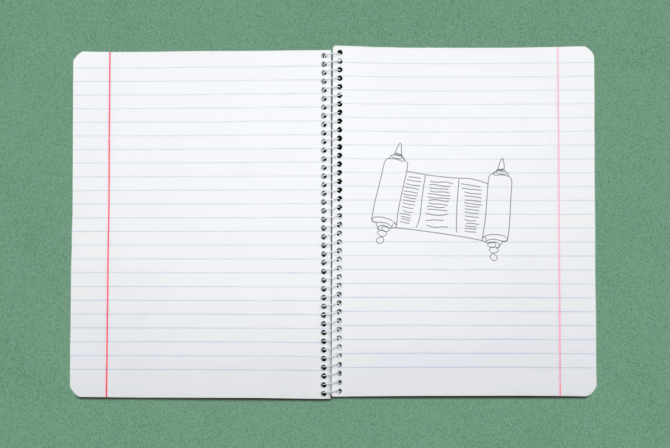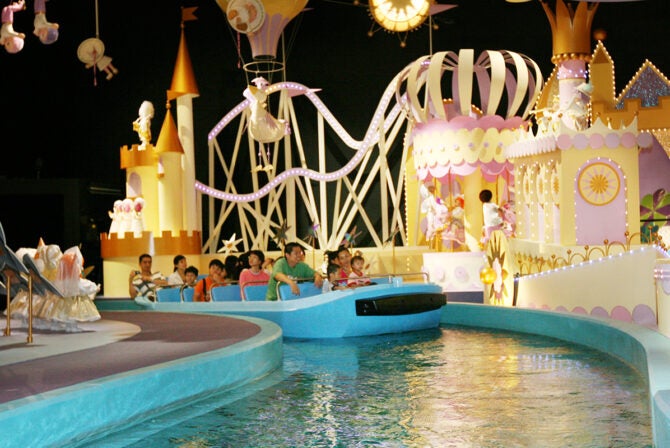My family drifted, rather than fled, the shtetls of Europe. I think. I’m not exactly sure; none of my relatives really liked to talk about it, so I get a patchwork quilt of family history.
I know my zayde on my father’s side left his village of some Unpronounceable Name—that was sometimes in Poland, and sometimes in Russia, depending upon which brand of Cossack was more successful at pogroms that day—and made the journey to Palestine, where (I’d like to believe) he drained swamps and made the desert bloom. And then he came to America. But I don’t know why. I don’t know what drove him to Palestine any more than I know what drove him to the States. All I know is that he and his 13 brothers and sisters settled in Chicago sometime in the ‘20s.
READ: What It Means to Be a Jewish Family in Rural Maine
The view from my mother’s side of the diaspora is even murkier. I heard there might have been a false-bottomed cart in which my zayde hid on the way to the harbor of some country-or-other, where he then boarded a ship that took him to Chicago by way of Ellis Island and Nashville and Indianapolis. There’s an uncle who stayed behind, who later became a fighter in the Resistance of the French Underground during the War, and I wish I knew his story—how he got to France, how he became a warrior, how he survived—but he settled in Florida after the war, and we didn’t know him all that well, and I was young and didn’t know enough to ask him before he died.
There are a couple of other uncles who never made it to the States, though a postcard came not long after the War, making its way through a chink in the Iron Curtain, so that we knew they had at least survived, but that was about it. That was all we knew, for decades. We found them again—or they found us—about 20 years ago, and we brought them and their families over to live here, with us. With family.
They settled, all of them, in each generation of drifting and flight, with their broken and heavily accented English and their unfamiliarity with American customs. They got married and had babies who grew and settled and got married and had babies who grew and settled and got married and had babies.
READ: Behind the Ethiopian Immigrant Riots in Israel, a Story of Hope
And now, because of their wandering, there is me, and my beloved son, who is growing, who will settle, who may have babies, or not. He will work and live and play and vote, and sometimes not. He will not always agree with the popular opinion, and he will not agree loudly. He will work tirelessly to prove that hope and humanity are stronger than hate. He will stand in indignation when this land—our land, forged in the fires of justice and cooled by the waters of freedom—and our people—all of us once strangers in a strange land—give in to the fear of The Other, of the Stranger.
We have not always welcomed these Strangers with open arms. We have imposed quotas and built fences, to keep us in, to keep The Other out. We claim national security as we shut the door and draw our families closer in such difficult times—anxious and grateful, both at once.
We got ours. We are safe—here, in this land of shining opportunity.
And we shut the door, once again, this time on the Syrian refugees, who are fleeing the chaos of their homeland, beset on every side with nowhere safe to go. They are forced to creep and hide and beg for aid, for safety, for the right to live and settle and grow roots and families. They live in fear—of their past, their present, and their very unknown future.
We are, all of us, strangers in a strange land.
READ: Filling in the Gaps of My Grandparents’ Jewish Past
My son will know the patchwork history of our family, these precious bits and pieces that are all I have to give him: how we started so very far from here, and suffered, and were afraid, and packed up and left, because their hope was stronger than their fear. And my son will stand on the shoulders of these beloved unknown giants, and he will lift the lamp and open the gates wide, just as they were opened for us: tired, poor, yearning to breathe free, homeless and tempest-tossed.
My son, like his great grandfather before him, will make the desert bloom.







